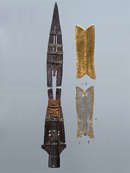
Divine Mercy Sunday is the Sunday following Easter. The Divine Mercy Novena begins on Good Friday.
How to Pray the Chaplet of Divine Mercy:
Begin with the Sign of the Cross, 1 Our Father, 1 Hail Mary and The Apostles Creed.
Sign of the Cross:
In the name of the Father, and of the Son, and of the Holy Spirit
Our Father:
Our Father, Who art in heaven, Hallowed be Thy Name. Thy Kingdom come. Thy Will be done, on earth as it is in Heaven. Give us this day our daily bread. And forgive us our trespasses, as we forgive those who trespass against us.And lead us not into temptation,but deliver us from evil. Amen
The Hail Mary:
Hail Mary,Full of Grace,The Lord is with thee.Blessed art thou among women,and blessed is the fruitof thy womb, Jesus.Holy Mary,Mother of God,pray for us sinners now,and at the hour of death. Amen
The Apostles Creed:
I believe in God, the Father Almighty, Creator of Heaven and earth; and in Jesus Christ, His only Son Our Lord, Who was conceived by the Holy Spirit, born of the Virgin Mary, suffered under Pontius Pilate, was crucified, died, and was buried. He descended into Hell; the third day He rose again from the dead; He ascended into Heaven, and sitteth at the right hand of God, the Father almighty; from thence He shall come to judge the living and the dead. I believe in the Holy Spirit, the holy Catholic Church, the communion of saints, the forgiveness of sins, the resurrection of the body and life everlasting. Amen
Then on the larger beads say the following:
Eternal Father, I offer You the Body and Blood, Soul and Divinity of Your dearly beloved Son, Our Lord Jesus Christ, in atonement for our sins and those of the whole world.
On the 10 smaller beads say the following for all 5 decades:
For the sake of His sorrowful Passion,
have mercy on us and on the whole world.
Conclude with (three times):
Holy God, Holy Mighty One, Holy Immortal One,
have mercy on us and on the whole world.
--------------------------------------------------------
Merciful Heart There are two scriptural verses that we should keep in mind as we involve ourselves in these devotional practices:
“This people honors me with their lips, but their hearts are far from me” (Is 29:13)
“Blessed are the merciful, for they shall obtain mercy” (Mt5:7)
It’s an ironic and somewhat frightening fact that many of the most religious people of Christ’s time (people who were actively practicing their religion and eagerly awaiting the promised Messiah) were not able to recognize Him when He came.
The Pharisees, to whom Christ was speaking in the first quotation above, were very devoted to the prayers, rules, and rituals of their religion; but over the years, these outer observances had become so important in themselves that their real meaning had been lost. The Pharisees performed all the prescribed sacrifices, said all the right prayers, fasted regularly, and talked a lot of about God, but none of it had touched their hearts. As a result, they had no relationship with God, they were not living the way He wanted them to live, and they were not prepared for the coming of Jesus.
When we look at the image of the Merciful Savior, or pause for prayer at three o’clock, or pray the Chaplet — are these things drawing us closer to the real sacramental life of the Church and allowing Jesus to transform our hearts? Or have they just become religious habits? In our daily lives are we growing more and more as people of mercy? Or are we just giving “lip service” to God’s mercy?











